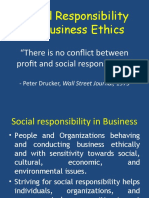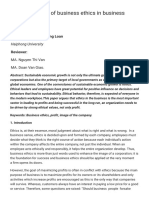Michelle M.
Bongalonta
DBA 511 – Social Responsibility and Good Governance
Activity 1.a
Direction: Read the article below written by Jaana Woiceshyn, author of the book “How to
Be Profitable and Moral:
Question: Do you agree with the article written below? Is profit deeply moral or is it
immoral? Discuss your insights preferably with specific example.
Business is in a dire need of moral defense. I have written recent posts defending the oil
sands producers and outsourcing by banks, but those are not the only companies under
attack. All business is accused of being immoral by the media, NGOs, unions, governments,
and the intellectuals. They blame business for “selfish greed”– i.e., for wanting to make
money. The critics demand that business renounce profits and “give back” to society. They
accuse business for not being “socially responsible,” and for serving only shareholders, not
all “stakeholders.” Both “social responsibility” and “stakeholder” are loaded terms the critics
invented to make us think that business belongs to “society,” not to its investors.
Sadly, many businesspeople accept these accusations because they agree with the wrong
idea that morality consists of self-denial, self-sacrifice, and scorn for material values. So
they try to atone for the alleged sin of profit making by appeasing the critics. Companies
engage in Corporate Social Responsibility (CSR) initiatives and pursue the Triple Bottom
Line of environmental, social, and financial performance, compromising profits. Such
capitulation to the critics is sad because their accusations are completely unjustified.
Business–the activity of production and trade for profit–is highly moral. Here is why:
1. Business creates wealth: it’s not a zero-sum game. Instead of competing for a limited
pool of existing values (as animals do), business firms (people running them) create
material values: they produce and trade goods and services that help us survive and enjoy
life. Without profit-seeking firms, we would be reduced to self-subsistence and at best, to
bartering with our neighbors: building our own shelters, growing or hunting our own food,
fashioning our own clothes. Without profit-seeking firms, there would be no accumulation of
capital needed for innovation and product development, no stock markets, banks, mass
production, jobs, and none of the products and services that we take for granted and that
make our lives longer, healthier, more comfortable and enjoyable.
By the standard of human life, the benefits of wealth creation are enormous—and the
demands of business “giving back” absurd. Giving back for what? Business firms have not
taken anything and do not owe anything to society. By selfishly pursuing profits they create
wealth that makes human life better. Demanding business to give up profits is detrimental to
human survival and flourishing.
2. Business is about trade: it’s a win-win. Business is accused of exploitation: charging
customers too much, and paying their employees and suppliers too little. But the idea of
business operating on the principle of predation is a myth. Successful business is based on
the principle of trade: business firms do not exploit others but trade value for value: products
for your money, salary for your labor, payment for your raw materials. Firms operate by
mutual consent and for mutual benefit with their trading partners: if the company or a
customer, a supplier, or an employee does not gain a value from the trade, they can, and
will, go elsewhere.
It is true that at any given time some companies are creating better products or services
than their competitors, or can afford to charge lower prices. But this does not mean that
their competitors are losers in the long term. Because business creates wealth, the size of
�the pie—of the market—is not fixed, and one company getting a larger slice of the pie does
not mean that others cannot get their desired share over time. And if competitors cannot
grow a particular pie more, they can always create a new pie—a new product or service—
and become winners in the new market.
3. Business pursues self-interest: the myth of the common good. Firms can survive
and succeed only by pursuing self-interest: profit maximization. Their critics exhort them to
compromise their self-interest and contribute to the “common good,” through charitable
donations and various CSR initiatives. But the question the critics and the capitulating
companies fail to ask is this: What is common good? It is implied to be the good of society—
which is merely a collection of individuals. Therefore, common good is the sum of the good
of each individual member of society; in order to maximize the common good, individuals
(or voluntary associations of individuals such as business firms) should maximize their own
good—pursue self-interest, without violating the rights of others. The moral justification of
self-interest is that human survival and flourishing—including that of business firms—
requires it.
Business is a force for good, and businesspeople are moral creators. They must recognize
this and defend themselves—and we should applaud them. Only that would silence the
critics and allow firms to focus on their purpose: wealth creation through profitable
production and trade of material values.
About the author:
Jaana Woiceshyn teaches business ethics and competitive strategy at the Haskayne
School of Business, University of Calgary, Canada. She has lectured and conducted
seminars on business ethics to undergraduate, MBA and Executive MBA students, and to
various corporate audiences for over 20 years both in Canada and abroad. Before earning
her Ph.D. from the Wharton School of Business, University of Pennsylvania, she helped
turn around a small business in Finland and worked for a consulting firm in Canada.
Jaana’s research on technological change and innovation, value creation by business,
executive decision-making, and business ethics has been published in various academic
and professional journals and books. “How to Be Profitable and Moral” is her first solo-
authored book.
Answer:
I agree with the article written by Jaana Woiceshyn entitled “How to Be Profitable and
Moral” where she expressed that business for profit is highly moral. She articulated three
reasons why earning profit is moral.
One, business creates wealth which is essential for survival and it makes life better. Say for
example, in a tribe where resources are limited, tribe members are forced to do hard labor
like hunting for food, planting vegetables and fruit-bearing trees, taking care of it, etc. When
they are sick, they will have to use what is available to them as medicine. But when
businesses are present within their community, they will have access to better options in
taking for their sick. Businessmen will bring breakthrough medicines to cure their sickness.
Two, business is all about mutualism, trading something of value for value. The search for
profit through voluntary exchange teaches people to be civil. Company A, for example,
needs raw materials to produce bread, labor to process materials into final products; Ms. B
plants wheat, Mr. C knows how to make bread; By exchanging resources, Company A will
have wheat and labor force to create bread, while Ms. B and Mr. C will have money and
even bread in exchange for their goods and services.
Third, business is for the common good. Profit is moral because flourishing and improving
one's life are moral; profit by definition cannot be destructive to one's own life. It encourages
us to try to imagine what it’s like to be someone else and to ask what other people would
�like. Profit will provide a basis for social transformation. Profit also allows individuals to act.
Through distributing surplus through individuals in employment and investment, profit acts
as a mechanism for the well-being of individuals and families. Similarly profit provides the
means for philanthropy at every level from an individual contributing to a local charity to the
larger-scale activities of the philanthropist.
Profits earned honestly in the market is moral.





































































































